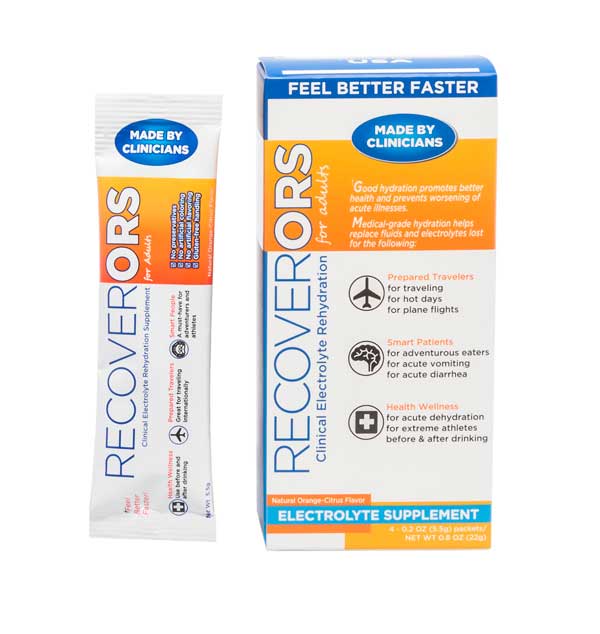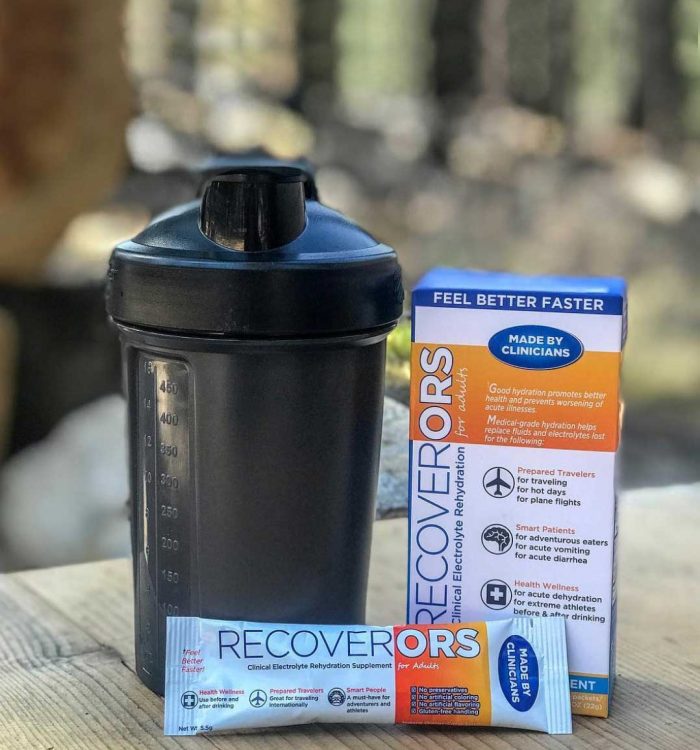You can be experiencing heat exhaustion symptoms like weakness or dizziness if the hot sun is beating down on you. But don't worry, there is a way that can speed up your recovery: oral rehydration salts. This article will look at how these salts can quickly improve your condition by reducing the intensity of heat exhaustion symptoms.
Dehydration and Heat Exhaustion:
Your body sweats to stay cool when you're outside in the heat, especially on a hot summer day. But when you perspire, you also lose necessary salts and liquids through your perspiration. You risk dehydration if you don't replenish these lost liquids and minerals. Dehydration can also result in heat exhaustion if it persists.

How Heat Exhaustion Affects You:
You may feel awful if you suffer from heat exhaustion. You can look out for symptoms like:
- Heavy sweating
- Weakness
- Dizziness
- Nausea
- Fainting
- High body temperature
- Feeling confused or agitated
How Oral Rehydration Salts Help:
Replenishing Lost Salts:
Your body is in urgent need of the salts it has lost via sweating when you experience heat exhaustion. This helps in restoring your body's electrolyte balance, which is necessary for your muscles to function properly.
Reducing Heat Exhaustion Symptoms:
The potential of oral rehydration salts to lessen the severity of heat exhaustion symptoms is one of the major advantages of taking them. You'll probably experience improvements in symptoms like weakness, dizziness, and nausea as your body replaces lost salts and fluids. You may begin to feel more at ease as your body temperature begins to drop.
How to Use Oral Rehydration Salts:
Mixing and Drinking:
Salts for oral rehydration are easy to use. Simply adhere to the directions on the packet. Usually, you have to combine a certain quantity of the salts with pure, safe drinking water. Drink the mixture slowly once it has been blended. Take little sips of it gradually rather than downing it all at once.

Dosage:
The dose of oral rehydration salts depends on the severity of the heat condition. It's important to thoroughly read the directions or speak with a healthcare provider if you have questions about the recommended dosage.
When to Use:
It's critical to respond quickly if you think you may be experiencing heat exhaustion. Find a nice, shady spot to sit first. To aid your body's recovery, try to sip the oral rehydration salt solution. Immediately seek medical help if your symptoms intensify or don't go away after a fair period of time.
Conclusion
In conclusion, keep in mind that oral rehydration salts might be your ally in the battle against heat exhaustion's symptoms whenever you find yourself struggling with its discomfort. When combined with water and properly consumed, these basic salts can replenish lost salts, restore fluid balance, and lessen the severity of symptoms related to heat exhaustion. But if you have questions about your situation, always speak with a healthcare physician, as they cannot replace expert guidance. With the right treatment and the help of oral rehydration salts, you can quickly recover from heat exhaustion and feel your best again.
Your body may lose water when you travel, which could make you feel unwell. Dehydration is what it is known as, and it occurs as a result of how dry airplane air is. You can learn why dehydration from flying occurs in this post and what you can do to stop it.
Why Do You Dehydrate Less While Flying?
Minimal Humidity
Very little water is present in the air on airplanes. When you breathe, you lose water more quickly due to the low humidity. Your body seems to be drying out.
Extreme Altitude
Air pressure is lower at higher altitudes in the sky, where planes travel. You breathe more quickly because your body has to work harder to receive enough oxygen. You lose more water when you breathe quickly.
A Little Supply Of Water
You might not have as much access to water while flying as you have while you're on the ground. There may not be enough water in the tiny glasses provided by the flight attendants.

How Does Being Dehydrated Affect You?
Dehydration symptoms can make you feel bad in a number of ways:
Thirsty
Feeling thirsty is the first indication of dehydration. You could feel like drinking something because your mouth might become dry.
Tired
You may experience fatigue and sluggishness if you are dehydrated. Your body seems to be operating at low power levels.
Headache
An absence of water might cause headaches. Your head can feel as if a tight band is surrounding it.
Dry Eyes And Skin
Dry skin and eyes are signs of dehydration. You can experience discomfort or itching.
Dizziness And Nausea
Dehydration can make you feel lightheaded or even sick in extreme circumstances. This is the time when action is truly required.
How To Be Hydrated While Flying?
Begin by talking about what you can do to prevent it now that you understand why it occurs and how it may make you feel:
Consume Water Frequently.
Drinking water is the most straightforward approach to remain hydrated. Don't wait till you're thirsty; sip water frequently while flying. Bring a refillable water bottle that is empty, and request that the flight attendants replenish it for you.
Skip The Alcohol And Coffee.
Caffeine and alcohol both increase water loss. Avoid drinking alcohol, coffee, and tea throughout the journey. Instead, drink water or herbal teas.
Hydrate Your Skin
You can use moisturizer to avoid dry skin. A tiny lotion container can keep your skin feeling soft and cozy.

Employ Eye Drops
Use lubricating eye drops if you have dry eyes. These may aid in easing any discomfort.
Chew Gum
Gum chewing can increase saliva production, preventing your mouth from being overly dry.
Avoid Salty Food
Having salty meals may increase your thirst. Try to avoid salty aircraft food.
Rest And Unwind
Prior to your departure, getting enough sleep might assist your body in handling the stress of travel. Try to sleep on the flight if you can.
Conclusion
Dehydration during flight can make the trip difficult. You now understand the causes and remedies, though. Regularly sip water and the best drinks for hydration, abstain from caffeine and alcohol, and take good care of your skin. You can keep hydrated and feel your best when flying by following these easy suggestions.
Imagine ascending a high place or a tall mountain. As you ascend, the air becomes more thin. You can feel fatigued and thirsty as a result, and your body may require electrolyte replacement. It is referred to this as dehydration. Your body lacks enough water to function correctly if you are dehydrated. But why does this occur more frequently in high places? This article will research that.
Why Does Dehydration Occur Higher Up?
At high altitudes, dehydration, which requires oral rehydration therapy, is more common for a number of significant reasons. The following are the main causes of dehydration in people who are high in the mountains:

Air With Less Moisture
The air gets drier when you ascend to higher elevations, such as mountains. This indicates that the air is less wet. Your body may lose moisture from this dry air. Each time you breathe, a small amount of water is lost. Therefore, your body loses water more quickly when the air is dry.
Accelerated Breathing
You could be breathing faster and deeper while you are at a high altitude (does flying dehydrate you?). Because the air is less oxygenated up there, your body performs this to obtain more oxygen. However, you also lose additional fluid through respiration as you inhale more quickly. Therefore, in addition to sweating, your body also loses water while you breathe.
Added Sweat
The human body heats up when individuals engage in physical activity at high places. Your body begins to perspire to stay cool. Your body produces water via your skin while you sweat. You will feel cooler as a result. However, you can lose a lot of water from your body when you perspire a lot. Additionally, you risk becoming dehydrated if you don't drink enough water to replenish the lost fluids.
Differential Kidney Function
In your body, your kidneys function as tiny filters. They produce urine and aid in blood purification. Your kidneys may begin to function differently while you are at a high altitude. They might cause your body to urinate out more water. You may become more prone to dehydration as a result of further fluid loss.
Not Having A Thirst
You might not always feel as thirsty while you are high in the mountains as you would in a dry environment. This can be challenging because your body may still require hiking electrolytes or extra water even though you do not feel thirsty. This occurs as a result of the greater altitude's potential impact on the area of your brain that detects thirst.

Height Sickness
Your body may not have sufficient opportunity to adjust if you ascend to high elevations too rapidly. The result could be altitude sickness. Headaches, nausea, and fatigue are some of the signs and symptoms of altitude sickness. Altitude sickness can make it difficult to eat or drink, which can exacerbate the effects of dehydration.
Winding It Up
High elevations increase the likelihood of dehydration due to dry air, accelerated breathing, more sweating, and modifications in renal function. In order to keep your body functioning properly and enjoy spending time in the hills without being fatigued and thirsty, it is crucial to be aware of these elements and take steps to stay for oral rehydration solution. Even if you are not feeling thirsty, keep in mind to routinely drink water and pay heed to your body's cues. You can get the most out of your high-altitude experiences while maintaining your health and comfort by staying hydrated.





